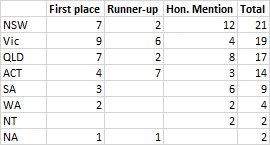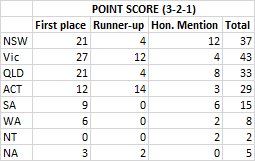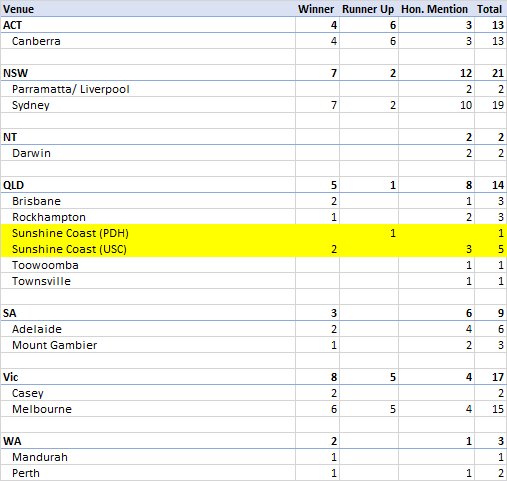To learn more about GovHack and the National Red Carpet event, which I attended as a representative of my team & the ACT Spirit of GovHack winner (and finalist for the National Spirit of GovHack), visit www.govhack.org




I've analysed the #opendata & here's the #GovHack 2018 Awards by the numbers:
There were 33 National Awards (including Spirit & Government Participation).
A total 88 Awards were issued: 33 First places, 18 Runner-ups and 37 Hon. Mentions.
Excluding Spirit of #GovHack & Gov Participation 59 teams won at least one Award.
Two teams won 3 Awards each:
- Tiny Happy People Hacking: 1 First place, 1 Runner-up, 1 Hon. Mention
- in time: 2 Runner-ups & 1 Hon. Mention
Another 16 teams won two #GovHack Awards.
- 5 teams won 2 First places! (as.numeric, Blockheads, Tartans-AU, insolvit & TeamTeam)
- Another 5 won 1 First place, with 3 also winning a Runner-up (Big Orange Brain, Oakton, TechPreppers) and 2 also an Hon. Mention (DataCake & TeamX).
41 #GovHack teams won 1 award: 13 won a First, 5 a Runners-up & 23 a Hon. Mention.
- Firsts:
ARVIS, Bachmanns and Fulwoods, Get Active USC, Hack aPEEL, I’m Learnding, Living Spirit, Lucky Shot, Motley Crue, Team Marika, Team Rocket, Technotelecomnicon, The Ogrelords, This Place
By state/territory, inc. State/Local Government Participation & Spirit of #GovHack, National #GovHack Awards followed population size (except ACT which punched above its weight):
- NSW won 21
- Vic won 19
- Qld won 17
- ACT won 14
- SA won 9
- WA won 4
- NT won 2
- Tas won 0 (sorry folks)
The #GovHack results looks a little different in detail, with Victoria winning more First places than anyone else & Queensland tying with NSW! (the NA are the National Government Participation Awards which I excluded as they give ACT an unfair bonus)

In fact, using a 3-2-1 scoring system for First Place, Runner-up and Hon. Mention, Victoria outscores NSW, and ACT even closer to the top three in the raw #GovHack award numbers.

Finally, looking at #GovHack National Awards by venue, the central city venues did better than regional locations in all cases, except in Queensland - where the Sunshine Coast won more awards than anywhere else in Qld, including Brisbane... Amazing work guys!!!
And here's the table of National #GovHack Awards by venue...

And that's the wrap on the by the numbers Awards for #GovHack 2018.
My data is still a bit messy, but I'll clean it up and put it in a Google sheet at some point in the next week so others can access it.










